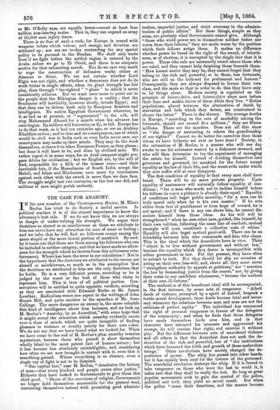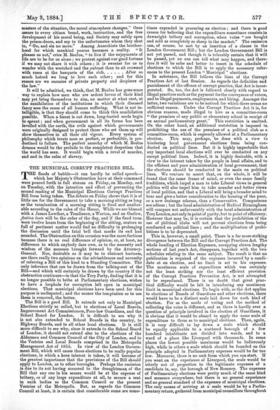THE CASE FOR ANARCHY.
IN the new number of the Contemporary Review, M. Elisee Reclus has tried to do Society a useful service. In political warfare it is of the utmost importance to know the adversary's best side. If we do not know this, we are always in danger of under-valuing his strength. We argue that doctrines so absurd or so mischievous as those we attribute to him can never have any attraction for men of sense or feeling ; and we infer that he will find no followers except among the more stupid or the more brutal portion of mankind. By-and- by it turns out that there are those among his followers who can be included in neither category, and that we have made no allow- ance for the strength which he derives from this unforeseen rein- forcement. Where has been the error in our calculation ? Not in the hypothesis that the doctrines we attributed to the enemy are absurd or mischievous, so much as in the assumption that the doctrines we attributed to him are the only doctrines that he holds. He is a very different person, according as he is judged by the worst or the best of those who claim to represent him. This is true of all political parties. Con- servatives will be entitled to quite opposite verdicts, according as they are associated with Edmund Burke or Mr. James Lowther. Radicalism wears one aspect in the writings of John Stuart Mill, and quite another in the speeches of Mr. Jesse Collings. The more dangerous an enemy is, the more valuable this kind of intelligence about him becomes, and we look up M. RecIus's "Anarchy, by an Anarchist," with some hope that it might reveal the attraction which anarchy evidently exerts over a class of minds which are quite incapable of finding pleasure in violence or cruelty merely for their own s dies. We do not say that we have found what we looked for. When we have come to the end of M. Reclus's plea, anarchy remains mysterious, because those who preach it show themselves wholly blind to the most patent fact of human nature ; but it has become less absolutely unintelligible, and, considering how often we are now brought in contact with it, even this is something gained. Where everything is so obscure, even a single ray of light is not to be despised. "One capital fact," says M. Reclus, "dominates the history of man—that every kindred and people yearn after justice." Hitherto they have looked to Governments to give them this chief good. "Shorn of the sanctions of religion, Governments no longer hold themselves answerable for the general weal, contenting themselves instead with promising good adminis- tration, impartial justice, and strict economy in the adminis- tration of public affairs." But these things, simple as they seem, are precisely what Governments cannot give. Although "those who wield power are in themselves neither better nor worse than their fellows," they are made worse by the position which their fellows assign them. It makes no difference whether power be based on the right of the sword, of inherit- ance, or of election, it is corrupted by the single fact that it is power. Those who rule are necessarily raised above those who are ruled, and they cannot help despising those beneath them. "How honest soever they may be, they cannot forget that they belong to the rich and powerful, or to those, less fortunate, who are still on the look-out for preferment and honour." Consequently, they are always disposed to favour their own class, and the more so that in order to do this they have only to let things alone. Modern society is regulated on the principle of laissez-faire, and laissez-faire slays men before their time and makes slaves of them while they live. "Entire populations, placed between the alternatives of death by starvation and toils which they detest, are constrained to choose the latter." There is the slavery. The average deaths in Europe, "according to the rate of mortality among the fortunate, should not exceed five millions ;" they are fifteen millions. There are the murders. Does not all this show us "the danger of entrusting to others the guardianship of our rights ?" Cannot we do better for ourselves than those whom we have hitherto set over us have done ? Society, in the estimation of M. Reclus, is a master who will one day awake to see his substance wasted by a dishonest steward, and who will then determine to try the experiment of managing the estate for himself. Instead of dividing themselves into governors and governed, let mankind for the future accept equality as the law of their life, and the worst evils under which they now suffer will at once disappear.
The first condition of equality is that every man shall have bread. There will be no more private property. Upon equality of sustenance will naturally follow equality of con- ditions ; "for a man who needs not to incline himself before his fellows to crave a pittance is already their equal." Equality of conditions will beget public morality, "for a man can be truly moral only when he is his own master." If he acts either from fear of punishment or from hope of reward, he is not moral ; and if there is any one above him, he cannot dis- sociate himself from these ideas. As his will will be strengthened " when he sees other men, guided, like himself, by their own volition, following the same line of conduct, mutual example will soon constitute a collective code of ethics." Equality will also beget mutual good-will. There can be no friendship between him who commands and him who obeys. This is the ideal which the Anarchists have in view. Their "object is to live without government and without law," because the equality which they desire is incompatible with either government or law. For the present, they have often to submit to both. But they should let slip no occasion of acting on their own free-will, and, above all, they must never "strengthen authority by appeals or petitions," nor "sanction the law by demanding justice from the courts," nor, by giving their votes to any candidate whatsoever, "become the authors of their own ill-fortune."
The realisatim of this beneficent ideal will be accompanied, in the first instance, by some acts of vengeance. "Albeit deeds of violence, prompted by a spirit of hatred, bespeak a feeble moral development, these deeds become fatal and neces- sary whenever the relations between man and man are not the relations of perfect equity." The individual has renounced the right of personal vengeance in favour of. the delegates of the community ; and when he finds that these delegates have made themselves lords over him, and in that character have betrayed his interests and aggravated his wrongs, he will resume that right, and exercise it without pity. But the difference between acts of anarchical violence and all others is that the Anarchist does not seek the de- struction of the rich and powerful, but of "the institutions which have favoured the birth and growth of these malevolent beings." Other revolutions have merely changed the de- positaries of power. The whip has passed into other hands, but it has equally been used for the torture of the governed. The anarchical revolution destroys the whip. If it is forced to take vengeance on those who were the last to wield it, it takes care that they shall be really the last. So long as great popular movements seek to gain the control of the police, political and civil, they yield no moral result. But when the police " cease their functions, and the masses become masters of the situation, the moral atmosphere changes." Once assure to every citizen bread, work, instruction, and the free development of his moral being, and Society may safely open the prison-doors, and say to the unfortunates whom they Shut in " Go, and sin no more." Among Anarchists the brother- hood for which mankind yearns becomes a reality. "It pleases us not," cries M. Reclus, "to live if the enjoyments of life are to be for us alone ; we protest against our good fortune if we may not share it with others ; it is sweeter for us to wander with the wretched and the outcast than to sit crowned with roses at the banquets of the rich After so much hatred we long to love each other ; and for this reason are we enemies of private property and despisers of the law."
It will be admitted, we think, that M. Reeks has gone some way to explain how men who are ardent lovers of their kind may yet bring themselves to aim, no matter at what cost, at the annihilation of the institutions in which their diseased fancy sees the cause of all human suffering. What is not in- telligible, is that they should come to think this annihilation possible. When a forest is cat down, long-buried seeds begin to sprout ; and when government in all its forms has been levelled with the earth, the evils against which governments were originally designed to protect those who set them up will show themselves in all their old vigour. Every system of philosophy which treats man as perfect, or perfectible, is pre- destined to failure. The perfect anarchy of which M. Reclus dreams would be the prelude to the complete# despotism that the world has seen. It would begin with a revel of murder, and end in the calm of slavery.



































 Previous page
Previous page